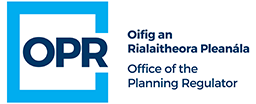Following formal submission to the Minister and the Chairperson of An Bord Pleanála yesterday (3rd October), the Office of the Planning Regulator (OPR) has published a report on the first phase of its review into certain systems and procedures used by An Bord Pleanála in the delivery of its statutory planning functions. The review report is available here.
Given recent matters of public concern, the OPR considered it necessary to instigate a review under section 31AS of the Planning Act. The focus of this review process is on examining the robustness and effectiveness of decision-making practices, the organisation of work, and governance arrangements (including in relation to planning case-file handling) of An Bord Pleanála.
Given the urgency associated with addressing these matters, and in accordance with the Terms of Reference published on 24th August, the review is being conducted in two phases. A draft report on the first phase of the review was provided to the Minister for Housing, Local Government & Heritage and the Chairperson of An Bord Pleanála on the 19th September for their consideration before being finalised yesterday.
The report makes 11 recommendations for implementation by An Bord Pleanála and the Minister, or for consideration in the context of the wider planning system and legislation. It is understood that the Minister has already incorporated a number of these recommendations into an action plan for the reform of An Bord Pleanála.
The recommendations, which are designed with the aim of strengthening procedures, restoring public confidence in An Bord Pleanála and ensuring the effectiveness of the overall planning system, are summarised as:
- Board Members: Given the number of existing vacancies, there is an urgent need to ensure that a sufficient number of board members are available to deliver An Bord Pleanála’s statutory purpose. Temporary board members should be appointed directly by the Minister to ensure the board can function while the panel-based nomination process for appointments is overhauled through new legislation.
- Quorums: The mechanism allowing board meetings with a quorum of two persons must be permanently removed. Furthermore, quorums of five persons should be made essential for certain categories of planning decisions.
- Conflicts of Interest: A new Governance, Ethics & Compliance Unit should be established within An Bord Pleanála, with an Ethics Officer appointed to manage and oversee this area. A renewed Code of Conduct is urgently required and it must be informed by a range of guiding principles that are set out in the OPR’s report.
- Decision-making: Formal procedures are required to identify and monitor conflicts of interest matters in relation to decision-making. The overall process for case-management and decision-making in An Bord Pleanála needs to be formalised in a coherently documented procedure.
- Board meetings: The previous practice of relying on individual board members to present planning cases at board meetings must cease in favour of these presentations being made by the inspector that prepared the planning report (or an appropriately delegated person).
- Legal considerations: A number of recommendations are made in respect of legal matters, including the establishment of a new in-house legal unit to support the decision-making of An Bord Pleanála.
Speaking following the report’s submission to the Minister, Planning Regulator, Niall Cussen said: “I wish to acknowledge the critical contributions made by the external experts, Conleth Bradley SC, Paul Cackette and John McNairney, to deliver this report alongside the OPR team led by Director of Planning Reviews, Gary Ryan.”
With regard to the conclusion of phase one of the review process, Paul Cackette said: “An Bord Pleanála has a critical role in the effective operation of the Irish planning system. As currently constituted, it faces multiple and complex challenges to restore public confidence. In our work on phase one of this review, we conclude that without major reform, An Bord Pleanála will find it increasingly difficult to function effectively. We recognise the many strengths of An Bord Pleanála’s expertise as demonstrated in the past. However, in our work and in our recommendations, we have focused on urgently identifying systems and procedures which are not, at present, adequate.”
John McNairney, added: “We are confident that in acting on the recommendations in this report and through the OPR’s ongoing oversight, An Bord Pleanála’s standing can be recovered. We believe that the implementation of the recommendations, in addition to recommendations that will arise from the second review phase, will help to ensure that that An Bord Pleanála’s decision-making is underpinned by robust and effective systems and procedures.”
As committed to under the Terms of Reference, the second phase will be delivered over the coming months, to conclude with the publication of a second report, including recommendations, by end-November 2022. The second phase of the review will be informed by detailed consideration of decision-making practices and activity within An Bord Pleanála, including the interface between board members and planning inspectors, processes for departing from inspector’s recommendations in board decisions, and further consideration of decision-making practice and procedure.
ENDS
External Experts
Conleth Bradley SC is a highly experienced barrister and legal professional with extensive experience in dealing with planning, local government, and environmental issues. Areas of practice include planning and local government law, constitutional law and European law, and administrative/public law.
Paul Cackette was formerly Chief Planning Reporter to the Scottish Government, with responsibility in that role for the Scottish planning and environmental appeals system. He was also Director of Legal Services and Head of the Government Legal Service in Scotland for a number of years.
John McNairney was formerly Chief Planner at the Scottish Government after a lengthy planning career in private consultancy and both local and central Government.
